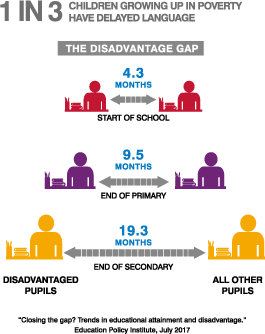The Impact of SLCN: The Challenge Facing Schools
(Page 14)
Good language skills are linked to achievement and life chances. A child starting school with poor language skills faces an uphill struggle to catch up. Unsupported language delays affect attainment, learning, literacy, social relationships, behaviour, mental health and ultimately employment and social mobility.
Even minor language delays at age 5 can, if unsupported, lead to more long term difficulties as the child progresses through school. Studies have shown that vocabulary at age 5 is a reliable predictor of later academic achievement.
Around 25% of children starting school across the UK have poor speech or language skills. This figure rises sharply for children growing up in poverty. For some of these children their problems will be obvious and will be linked to other developmental difficulties. However, many children’s language difficulties are less easy to observe and can remain hidden for some time.
Without addressing this, schools cannot raise attainment or narrow the performance gap between children growing up in poverty and those from more affluent homes. Yet how can schools do this when many of these children will not meet the referral criteria for local NHS Speech and Language Therapy services?
Our services/packages help schools to ensure early identification and intervention to raise attainment and narrow the gap between disadvantaged and non-disadvantaged children. This is designed to complement the support from local Speech and Language Therapists.

“Closing the gap? Trends in educational attainment and disadvantage.” Education Policy Institute, July 2017
Did you know…?
- The gap between the best and worst 10 year old readers is 7 years.
- Children living in poverty hear 8 million fewer words a year.
- Good language skills are the best way to improve social mobility.
- 1 in 6 children in school do not have English has their first language.
- Half the children referred to mental health services have significant language difficulties.
- 81% of children with emotional and behavioural difficulties have underlying language problems.
- ‘22% of SEN support pupils in England have SLCN as their primary need.’
Sources: Early Language Delays in the UK. Law, J. et al (2013), Read On Get On campaign (2014) Save the Children, Early Intervention Foundation report (2015), I CAN report (2016), I CAN Impact Report 2016/17, DFE School Census Data 2017.

‘As a school we have been using the Language Link interventions programme over the past 5 years and it had proved invaluable with regard to narrowing the attainment gap and helping children to achieved.’ Early Years Teacher, Bridgehall Primary School, Stockport.
“22% of SEN support pupils in England have SLCN as their primary need.”
DFE School Census Data 2017
Find out more about how Language Link can help your school:
Infant Language Link
Junior Language Link
Secondary Language Link
Please login to view this content
Login